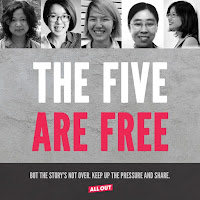 |
| Women in China are beginning to speak out https://images.app.goo.gl/g2MLiNZViZ37h56LA |
 |
| Luo Xixi after sharing her story in January 2018 https://images.app.goo.gl/7L532JgqcHaJ4VS6A |
Female students across China were inspired to share their own experiences across a multitude of campuses and multiple former students made formal allegations against Chen Xiaowu, who was subsequently dismissed from Beihang. The hashtag was utilized approximately 4.5 million times on Weibo (2) and a state-run newspaper gave support to the fledgling campaign by urging victims to share their experiences. Within 18 days of Xixi's open letter, over 50 professors advocated for a zero tolerance policy towards sexual misconduct on university campuses and the Ministry of Education agreed to work on a durable solution to prevent sexual harassment in higher education (3).
 |
| The feminist five were targeted by Chinese authorities. https://images.app.goo.gl/LsEJnayRGbfd2yZp8 |
China still has a long way to go in order to cultivate a culture free from powerful male figures exploiting their female counterparts, but Luo Xixi was instrumental in starting the narrative. Luo showed courage and inspired other ladies to do the same, bringing awareness to a systemic issue. Without her open letter on Weibo, a predatory professor would still be able to exploit young woman who are simply attempting to better their education. Every move made to make higher education safer and to end sexual violence is a major victory for all women internationally.
Works Cited
(1) Denyer, Simon, and Amber Ziye Wang. “Chinese Women Reveal Sexual Harassment, but #MeToo Movement Struggles for Air.” The Washington Post, WP Company, 9 Jan. 2018, https://www.washingtonpost.com/world/asia_pacific/chinese-women-reveal-sexual-harassment-but-metoo-movement-struggles-for-air/2018/01/08/ac591c26-cc0d-4d5a-b2ca-d14a7f763fe0_story.html.
(2) Yuan, Karen. “#MeToo With Chinese Characteristics.” The Atlantic, Atlantic Media Company, 8 Feb. 2018, https://www.theatlantic.com/technology/archive/2018/02/metoo-in-china/552326/.
(3) Kao, Karen. “Luo Xixi Archives.” Shanghai Noir, 20 Dec. 2018, http://inkstonepress.com/tag/luo-xixi/.
(4) Shepherd, Christian. “China's #MeToo Movement in Colleges Initially Encouraged by...” Reuters, Thomson Reuters, 31 Jan. 2018, https://in.reuters.com/article/uk-china-harassment-insight/chinas-metoo-movement-in-colleges-initially-encouraged-by-authorities-then-frustrated-idINKBN1FJ33G.




Maddison, I really enjoyed reading your blog post about Luo Xixi. I had heard of the #metoo movement, but I had never heard of Luo Xixi, so I loved learning about her! I didn't know that the Me Too movement actually began in 2006. I always thought it was a recent movement to encourage victims of sexual harassment and assault to come forward, but I was happy to read that this movement has been around for a little bit of time and has been helping victims to find their voices. Having to go through an experience like Luo has to be extremely traumatizing and I could never imagine the pain and sorrow that these people have to go through. The fact that Luo voiced publicly what happened to her, even though she lived in a communist country, is very brave and shows just how powerful and resilient she is. It saddens me that the feminist movement in a communist country faces opposition and leads to the victims feeling as if they cannot speak out because they won't be heard or believed. Something that I found very interesting in this post was how Luo changed up the hashtag from #metoo to #ricebunny to allow women to feel safe yet again to speak up and voice their experiences. It is women like Luo that will continue to help victims find the courage to speak up when the country is trying to shut them down.
ReplyDeleteI really like how you incorporated links throughout your blog to find more information. Also, I found that the first image on the blog was so powerful. It really does a great job demonstrating women helping women to find their voices.
-Kayleigh
I think it is important to talk about feminist movements in other countries because it helps ground us to remember that equality is universal. I knew that the #metoo movement wasn't just an American movement but I hadn't heard about how it happened in China. I found the story of Luo Xixi inspiring as well as the story about the feminist five.
ReplyDeleteXixi's courage is astounding, especially given China's recent history of censorship. It doesn't surprise me that the #MeToo hashtag was changed to #RiceBunny either. Thank you for choosing an activist from another country, as Americans we're often disconnected from various activist movements around the world! I can't imagine how terrifying it must be to speak about these issues when they're so heavily censored in her country. Great job!
ReplyDelete